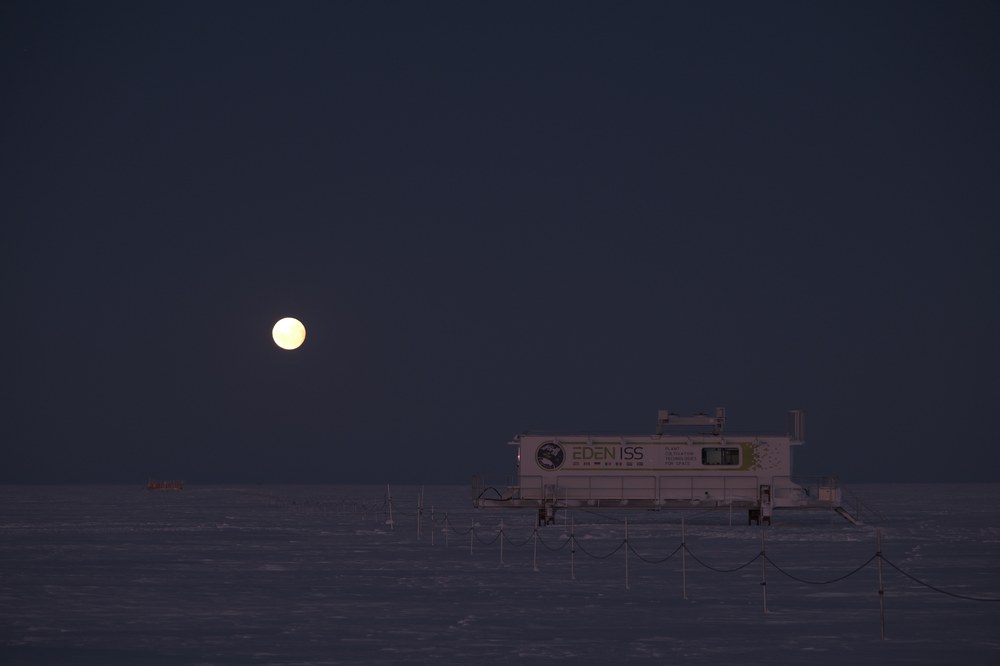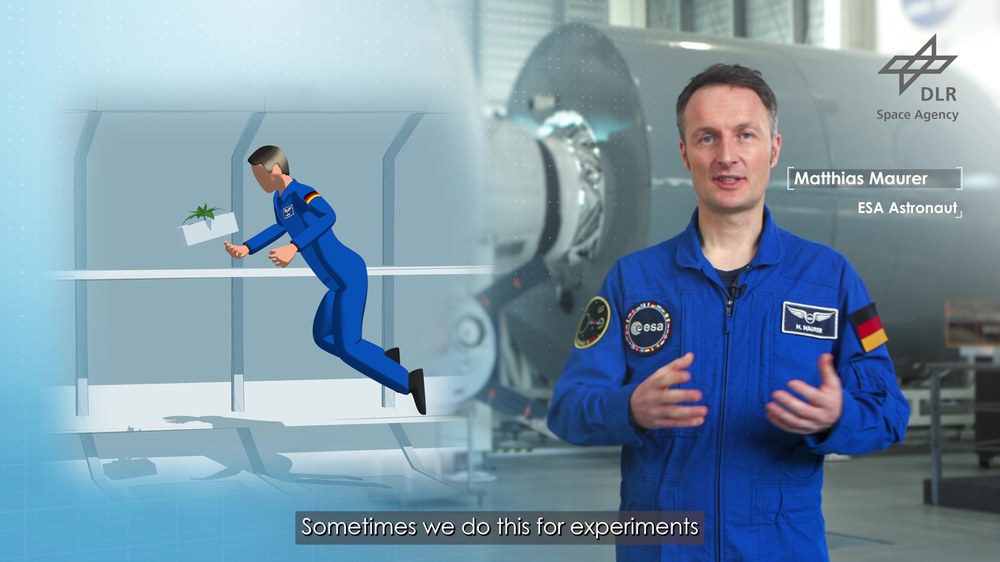Successful and diverse harvest in darkness and eternal ice


© Jess Bunchek, DLR/NASA/AWI

Your consent to the storage of data ('cookies') is required for the playback of this video on Youtube.com. You can view and change your current data storage settings at any time under privacy.
- NASA guest scientist Jess Bunchek has worked successfully in DLR's EDEN ISS Antarctic greenhouse.
- An abundant harvest with numerous vegetables and herbs.
- Bunchek collected extensive data on system performance and resiliency, crop health and production, environment and crop microbiology, food safety, nutrition, crew psychology and use of resources such as power, water and crew time, which are now being evaluated.
- These data will now be compared with NASA plant cultivation experiments on the International Space Station.
- Focus: Spaceflight, future food production
Jess Bunchek, the NASA guest scientist at the German Aerospace Center (Deutsches Zentrum für Luft- und Raumfahrt; DLR) EDEN ISS greenhouse, is nearing the end of her mission in Antarctica. Bunchek has been living and working as a member of the 41st overwintering expedition at the German Neumayer III Station, operated by the Alfred Wegener Institute, Helmholtz Centre for Polar and Marine Research (AWI) for almost one year. She has experienced extreme cold and nine weeks of polar nights. During her time there, she has cultivated numerous vegetables and herbs without soil and using artificial light. The completely self-sufficient greenhouse has produced an abundant harvest for the overwintering crew, which was isolated for months. This included crops including broccoli, cauliflower and kohlrabi. The joint test, conducted by DLR and NASA, paves the way for cultivating fresh food on future missions to the Moon and Mars, as well as in climatically unfavourable regions on Earth.
"We have never been able to grow so many different varieties of vegetables and herbs during an overwintering mission with EDEN ISS," says Daniel Schubert, project leader from the DLR Institute of Space Systems in Bremen. "Jess Bunchek has shown great skill and dedication here and we were able to try out a large number of new varieties, including some from NASA."

© Markus Baden, DLR/NASA/AWI
Abundant harvest from chard to oregano
Over the course of the year, Bunchek has successfully harvested various plants and fruits, some of which have also been grown on the International Space Station (ISS), including various types of mustards and salads. The 'Española Improved' chilli peppers have added spice and vitamin C to meals during Bunchek's mission in Antarctica, as well as in the very different conditions aboard the ISS as part of NASA's Plant Habitat-04 experiment. Bunchek has also grown tomatoes, cucumbers, beans, peas, leafy greens, watercress, arugula, broccoli and cauliflower, chard, spinach, kohlrabi, pak choi and radishes. She also cultivated different varieties of herbs including mint, basil, parsley, chives, rosemary, thyme and oregano.
"I am relieved by how well the crops have grown thus far," says the delighted botanist. "EDEN ISS is unique and groundbreaking in that respect. We are collecting large amounts of data on system performance and resiliency, crop health and production, environment and crop microbiology, food safety, nutrition, crew psychology and the required inputs such as power, water and crew time." Ray Wheeler, a senior scientist at NASA's Kennedy Space Center adds: "We hope to build on Jess's experience with EDEN ISS to gain a better understanding of what it might take to grow fresh food on future missions to the Moon and Mars."
Green habitat despite ice, darkness and storms
During Bunchek's stay, there were several strong storms, including one that caused the highest winds ever recorded in the area. During these storms, she could not venture outside to walk the 400 metres between Neumayer III Station and the greenhouse. On these days, the EDEN ISS greenhouse was fully monitored and operated from the control centre at the DLR Institute of Space Systems in Bremen. "Similar to agriculture, we have to accept the fact that weather and climate are the determining factors," says Bunchek. "But I am here to learn how we can use technology to thrive in extreme conditions, whether it is a crew in space or communities dealing with climate change."
One of the studies she conducted looks at the psychological impact of having fresh fruit and vegetables available and being able to observe and interact with the plants. NASA astronauts on the ISS have conducted similar experiments and completed several studies on cultivating plants in the Vegetable Production System, referred to as 'Veggie'. "We will now be able to compare the crew psychology of the astronauts on the Space Station as they work with 'Veggie' and the Advanced Plant Habitat with the Antarctic overwintering crew members at Neumayer interacting with EDEN," says Bunchek. "With a small overwintering crew and a long isolation period, Neumayer is a great space analogue setting for this kind of study."
Overwinterers enthusiastic about fresh vegetables
"Extreme cold, severe storms and polar night make the Antarctic one of the most fascinating habitats on our planet, and these qualities also make it an ideal test site for growing vegetables under space-like conditions," said Tim Heitland, former Neumayer overwintering crewmember and Station Manager, and now Medical Coordinator at AWI. "There is a complementary relationship between Neumayer Station and the EDEN ISS greenhouse – the plant researchers draw on the station's resources, and the other scientists there are excited by the regular supply of fresh vegetables."
Working with researchers from Germany, Bunchek has seen the biggest differences emerge between generations rather than countries of origin. "I have learned a lot from my crewmates, and I hope they have learned one important life skill from me – the endless number of possible food combinations involving peanut butter." After spending 14 months surrounded by eternal ice, Bunchek will leave Antarctica and return to civilisation in early 2022. Seeing the Sun for the first time after the polar night left her speechless. "It will be bizarre to relearn and re-experience even the most basic conditions such as rain, thunderstorms, rocks and soil – not to mention, night-time, because, right now, we are in permanent 'polar day'."
EDEN ISS: Food supply of the future
Global food production is one of the key challenges facing societies in the 21st century. The growing world population and ongoing upheavals due to climate change mean that there is a need for new solutions for cultivating crops, particularly in regions with unfavourable climatic conditions. In deserts and locations with low temperatures, closed greenhouses allow produce to be harvested regardless of the availability of sunlight and the time of year, while using less water and eliminating the need for pesticides and insecticides. The EDEN ISS project is subjecting a futuristic model greenhouse of this kind to long-term testing in extreme Antarctic conditions.

